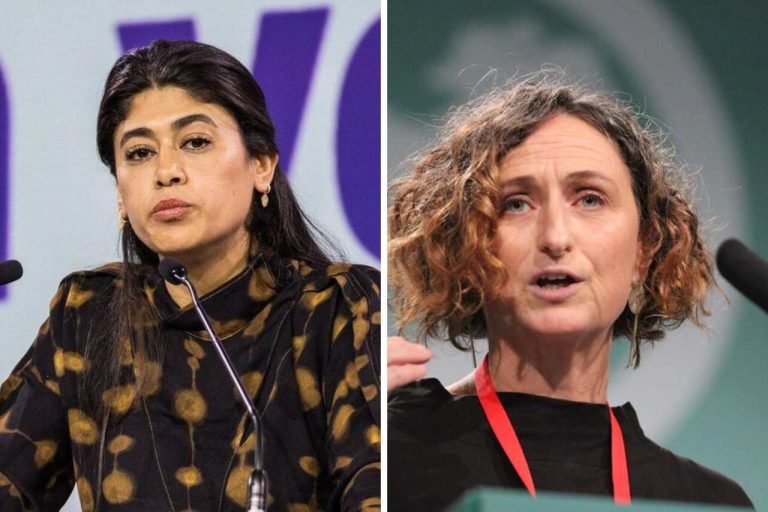TEL AVIV, Israel – In a move stirring international debate, Israel on Monday denied entry to two members of the European Parliament, citing boycott advocacy and political opposition as key reasons.
Who Were the Lawmakers Denied Entry?
The two officials—Lynn Boylan of Ireland and Rima Hassan of France—were turned away at Ben-Gurion International Airport and sent back to Europe. Both belong to The Left group in the EU Parliament and were reportedly on a diplomatic mission to the occupied Palestinian territories.
-
Lynn Boylan chairs the EU Parliament’s Delegation for Relations with Palestine and is affiliated with Ireland’s Sinn Féin party.
-
Rima Hassan, born in Aleppo, Syria, is a member of France Unbowed, a hard-left political party in France.
While no official reason was immediately given for Boylan’s denial, Israeli authorities accused Hassan of actively promoting boycotts against Israel, referencing her social media posts and media interviews.
What Was the Purpose of Their Visit?
Boylan stated that the purpose of her visit was to meet with:
-
Palestinian Authority representatives
-
Civil society organizations
-
Palestinians living under Israeli occupation
She condemned Israel’s action, saying:
“This utter contempt from Israel is the result of the international community failing to hold them to account… Israel is a rogue state, and this disgraceful move shows their disregard for international law. Europe must now hold Israel to account.”
Tensions Over EU-Israel Relations Intensify
The denial of entry comes amid rising political friction. Just days earlier, The Left group in the European Parliament urged the suspension of the EU-Israel Association Agreement. Their call was linked to ongoing investigations by the International Court of Justice (ICJ) into alleged war crimes committed in Gaza.
At the same time, Israel’s Foreign Minister Gideon Saar was in Brussels for a rare meeting of the EU-Israel Association Council, held under growing pressure from countries like Spain and Ireland to suspend the forum due to Israel’s military actions in Gaza.
What Does Israeli Law Say About Entry Restrictions?
In recent weeks, Israel passed a new law that expands its authority to restrict entry to foreigners. This legislation:
-
Bars entry to anyone who denies or downplays Hamas’ October 7, 2023 attack
-
Prohibits entry to individuals supporting legal action against Israeli soldiers
-
Reinforces prior laws banning entry to advocates of the BDS movement
-
Continues to block Holocaust deniers
This legal framework allows the Israeli government to deny access to non-citizens who are deemed hostile or supportive of movements that “delegitimize” the state.
Understanding the BDS Controversy
The Boycott, Divestment, and Sanctions (BDS) movement aims to apply international pressure on Israel regarding its policies toward Palestinians.
-
Supporters describe BDS as a peaceful, rights-based campaign modeled after the anti-apartheid movement in South Africa.
-
Israeli officials, however, view BDS as an existential threat and claim that some of its proponents harbor antisemitic motives—an allegation BDS advocates strongly reject.
Protests and Reactions in Brussels
In response to the incident, Hassan called for a protest outside EU headquarters during Monday’s Association Council meeting. Activists gathered to oppose Israel’s continued military operations in Gaza and what they see as Europe’s complicity.
At a press briefing earlier that day, Saar addressed the controversy:
“We are open to criticism—as long as it does not cross into delegitimization, demonization, or double standards, which we unfortunately encounter too often.”
Conclusion
The denial of entry to two sitting EU lawmakers has reignited debate over Israel’s treatment of international critics and its relationship with Europe. As tensions continue over Gaza and diplomatic pressure mounts from within the EU, this incident may serve as a catalyst for re-evaluating future engagement between the two sides.
FAQs
Q1: Why were Lynn Boylan and Rima Hassan denied entry to Israel?
Boylan’s entry was denied without a stated reason, while Hassan was accused of advocating boycotts and supporting legal action against Israeli soldiers.
Q2: What is the EU-Israel Association Agreement?
It is a framework for political and economic relations between the EU and Israel, which some MEPs now seek to suspend due to alleged human rights violations in Gaza.
Q3: What does Israel’s new entry law state?
The new law bars entry to foreigners who deny Hamas attacks, support ICC prosecutions of Israeli troops, advocate BDS, or deny the Holocaust.
Q4: What is the BDS movement?
The BDS (Boycott, Divestment, Sanctions) movement is a global campaign aimed at pressuring Israel to end its occupation of Palestinian territories.
Q5: How has the EU responded to Israel’s entry bans?
While the EU hasn’t taken unified action, individual countries and lawmakers—particularly from Ireland, Spain, and France—are urging diplomatic reassessment.

